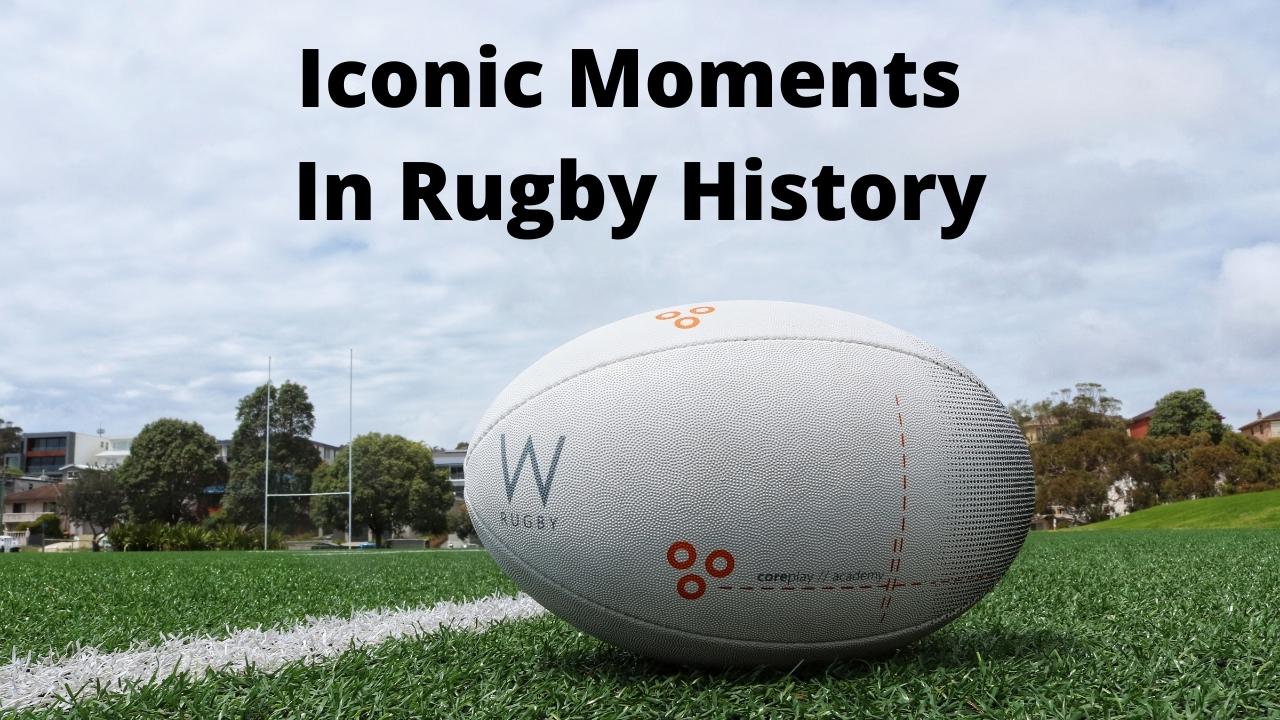Rugby is a massively misunderstood sport. To a layman’s outsider, it can look violent and undisciplined, with players simply charging at each other with no regard for safety. However, to an educated rugby fan, the sport is gentlemanly and tactical.
10 Iconic Moments In Rugby History
Players must contend with the rather tricky art of the scrum, passing is only possible backwards or sideways, and several other arcane rules are, in many cases, the inspiration for American football. Rugby is also not without its defining incidents throughout history. Here, in no particular order, are ten iconic moments that helped to shape the modern sport of rugby as we know it today.
Wales won two Six Nations Grand Slams in 2005 and 2008
The Welsh rugby team is one of the greatest globally, participating in the prestigious Six Nations tournament alongside other luminaries like England and Italy. Winger Shane Williams helped take the Welsh team to victory in two Grand Slams in 2005 and 2008 and is the only Welsh rugby player to win the IRB Player of the Year award.
Speaking to sports betting platform Betway, Williams described the wins as “one of my highest achievements” but acknowledged that winning the Six Nations takes “a massive amount of luck”.
Jonah Lomu made his mark in 1995
At the 1995 Rugby World Cup, England and New Zealand had much to prove. As two of the most potent rugby teams in the world, they were destined to face off against one another at the semi-final, and a lot was riding on that match.
England hadn’t banked on the veritable colossus Jonah Lomu, though, and the winger utterly destroyed England, carving a path through their defence without even batting an eyelid. This moment has gone down in history as the sadly-missed Lomu’s most exemplary performance.
“Fastest player” gets outstripped, 2007
South African outside centre and sometime-winger Bryan Habana had a reputation as the fastest player in the world back in 2007. Habana was looking to defend that reputation as his team took on the USA at the 2007 Rugby World Cup.
Still, the world was shocked as Takudzwa Ngwenya left Habana in the dust during a particularly memorable play. Unfortunately, the USA didn’t win off the back of that momentum, but Habana’s armour was cracked.
Jonny Wilkinson’s desperate victory, 2003
Another huge player in the rugby world is Australia, a formidable national team that has been christened “The Wallabies”. At the 2003 Rugby World Cup (are you sensing a pattern emerging here?), a desperate final between England and the Wallabies was down to the wire with a 17-17.
During the game’s final moments – as the clock was down to 20 seconds – fly-half Jonny Wilkinson scored a drop-goal to bring England the victory with a nail-biting 20-17 finish.
France thrashes New Zealand, 1999
France’s battle against New Zealand in the 1999 Rugby World Cup wasn’t even the final, but it packed enough drama into its running time to justify the central event billing. New Zealand, buoyed by a terrifyingly fit Jonah Lomu, was battering Les Bleus 24 to 10.
At that point, Christophe Lamaison decided he’d had enough and led a fearsomely impressive charge, taking the French team to victory with 33 points that went unanswered by the All Blacks.
Italy joined the Six Nations in 2000
Before it was the Six Nations, it was, as you might have guessed, the Five Nations. England, Scotland, Ireland, Wales, and France (the list is heavily skewed towards the UK) were happy, but the Italian team made a strong case for their addition to this tournament.
After Italy’s admission to the Six Nations, the team battered Scotland 34 to 20 in Rome to cement its reputation. There are now rumblings that Italy should be deposed to make South Africa.
Jonah Lomu’s nail-biting victory in 2000
Just as there are rivalries in English football – think Aston Villa and Birmingham City or Manchester United and Manchester City – there are rivalries in rugby. Australia’s friendly rivalry with New Zealand is one of the biggest. In 2000, a battle between the two saw the All Blacks claim a dominant lead of 24-0 within just nine minutes of play.
The Wallabies clawed it back and scored a staggering 24 points before half-time, but Jonah Lomu – of course – grabbed the game back during its closing moments.
England told to “go home” at home, 2015
In 2015, England played host to the Rugby World Cup, and it’s often expected that home teams will take home the victory due to home-field advantage. However, that wasn’t the case that year, as Wales dented England’s psychological well-being with a 28-25 win.
After this, England was irreparably damaged for that tournament, and the Wallabies swept in to neatly dispatch the Lions and send them packing. Wales head Warren Gatland described the feeling as “incredible”.
Ireland beats New Zealand for the first time in over a century, 2016
The old refrain in the song “Three Lions” talks of England’s “thirty years of hurt”, but that’s nothing compared to Ireland’s woes against the All Blacks. The Shamrocks hadn’t managed to emerge victorious in a game against the Kiwis for over a hundred years, so in 2016, it was all to play for.
Nobody expected Ireland to win; the All Blacks were sitting on an 18-win streak, but Ireland managed to emerge victoriously, finally ending a hundred and eleven (yes, really) years of hurt.
Jonah Lomu dies, 2015
Finally, we end our list on a somewhat sombre note. Unfortunately, despite an unbroken run as arguably the greatest rugby player of all time, New Zealander Jonah Lomu was diagnosed with a rare kidney condition that forced him to step back from playing professional rugby.
This condition later proved fatal when Lomu suffered an unexpected heart attack in 2015 due to his illness. He will go down as one of the most well-respected and celebrated players ever to take to the field.











